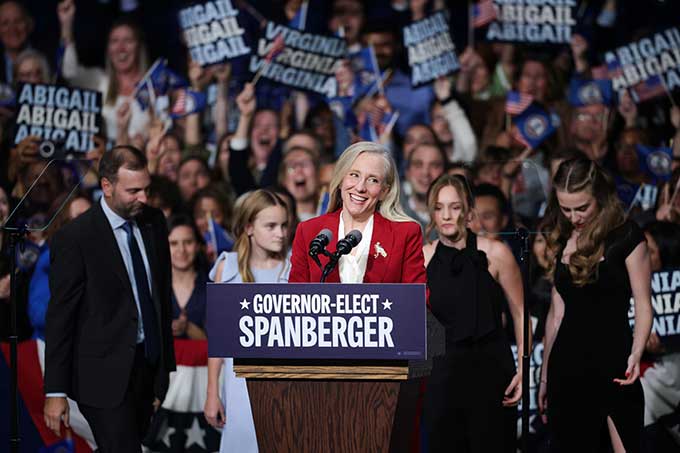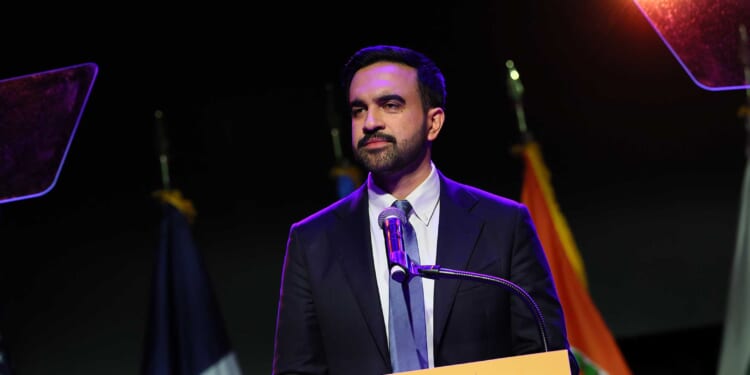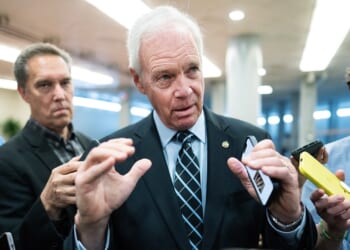This essay first appeared at City Journal’s Substack.
On Tuesday night, one year after Donald Trump’s reelection, Americans returned to the polls. The marquee contests—the governorships in Virginia and New Jersey, and New York City’s mayoralty—presented starkly contrasting futures for the Democratic Party.
Finally, a reason to check your email.
Sign up for our free newsletter today.
In Virginia, Democrats flipped the governor’s mansion by nearly 15 points, reclaiming a state they’d lost to Republicans just four years ago. In New Jersey, Rep. Mikie Sherrill maintained party control by a similar margin. In New York City, the Democratic nominee also held on to City Hall—but Zohran Mamdani’s margin was the narrowest in a generation, roughly 30 points lower than Eric Adams’s 2021 landslide.
If Democrats were smart, they would make their overperforming moderates—Abigail Spanberger in Virginia and Sherrill in New Jersey—their template for the future. Both built campaigns around competence and moderation, rejecting the extremes that have alienated swing voters in both parties. Presenting themselves as regular congresswomen slightly embarrassed by the drama of national politics, they reminded suburban voters what it feels like to be governed by adults.
But that’s not the story Democrats are telling. The attention, the oxygen, and the viral clips all belong to Mamdani. The mayor-elect is a millennial, socialist, Muslim insurgent who built his brand by railing against police, capitalism, and the Jewish state. He won comfortably, if unimpressively, in one of the nation’s bluest cities. Still, the cameras followed him, not Spanberger or Sherrill.
Mamdani’s underwhelming win illustrates the limits of the far left’s appeal. He secured the nomination not through persuasion but by default. The moneyed establishment cleared the field for Andrew Cuomo, a scandal-scarred ex-governor. That left a vacuum for a hard-left challenger to fill.

Elsewhere, the socialist brand fared even worse. In Minneapolis, incumbent Mayor Jacob Frey easily fended off a challenge from Omar Fateh, another DSA-backed Muslim socialist. In Seattle, as of today, an activist-left challenger still trails significantly behind a mainstream Democratic incumbent mayor. Voters in New York signed off on a hard-left experiment, but the same strategy doesn’t seem to be working in other hyper-progressive cities.
Why, then, are people celebrating Mamdani and not his moderate counterparts? Part of the reason is sociological: the people who work in Democratic politics are far more progressive than the people who vote for Democrats. To them, Mamdani’s ascendance is a thrill—a sign that their moral project has energy and that politics can once again feel like activism.
Another reason is structural: the national media thrives on spectacle and novelty, not managerial competence. Mamdani makes for good television; Spanberger doesn’t. And Republicans are happy to play along, eager to make Mamdani the face of the Democratic Party so they can run against him everywhere else.
This attitude helps explain why the GOP had no chance of competing in New York’s election. Republicans offered perennial gadfly Curtis Sliwa, who finished with a paltry 7 percent of the vote. Sliwa’s showing brings to mind Bloomberg’s Joe Weisenthal, who joked that “the Republican Party has nothing to offer downwardly mobile voters with graduate degrees.” He’s right. There aren’t that many of those voters, but they’re heavily concentrated in major blue cities. That’s part of why Republicans remain irrelevant locally, despite winning nationally.

If the GOP wants to prevent the Zohranification of America’s cities, it should at least try to compete in them. That would mean giving some latitude to serious local candidates willing to put daylight—tonally and even policy-wise—between themselves and the national party. Rudy Giuliani and Michael Bloomberg were moderates out of step with the national GOP, but they were conservative enough to pull the city rightward.
Today, Republicans nominate Sliwa types who alienate themselves from the national brand, too, but less strategically—witness President Trump’s endorsement of Cuomo, not Sliwa, in New York. Republicans can do better, but they need to take cities seriously, funding candidates who might have a prayer of winning.
When running on the GOP line in a blue city or state, it’s nearly impossible to win without being visibly moderate relative to the national party. Voters in these jurisdictions aren’t typically looking for ideological warriors, especially not ones from outside their usual party. When Old Dominion voters sent Glenn Youngkin to Richmond four years ago, they did so because he made his campaign about his normalcy relative to Democrats’ embrace of cultural radicalism.
For Democrats, the path forward is simple, if not easy: follow the voters, not the vibe. Spanberger and Sherrill won by acting as if politics were about running a state, not leading a movement. That model is the surest route to national power and social stability. The Mamdani model is a shortcut to more cultural acclaim but fewer actual victories.
For Republicans, the challenge is symmetrical: if they want to keep cities from becoming laboratories for leftist politics, they’ll need to run candidates who want to govern them. That means being credible stewards of order, affordability, and opportunity.
On Tuesday, moderation won again. The only question is whether anyone in either party will notice.
Top Photo by Michael M. Santiago/Getty Images
City Journal is a publication of the Manhattan Institute for Policy Research (MI), a leading free-market think tank. Are you interested in supporting the magazine? As a 501(c)(3) nonprofit, donations in support of MI and City Journal are fully tax-deductible as provided by law (EIN #13-2912529).
Source link


















